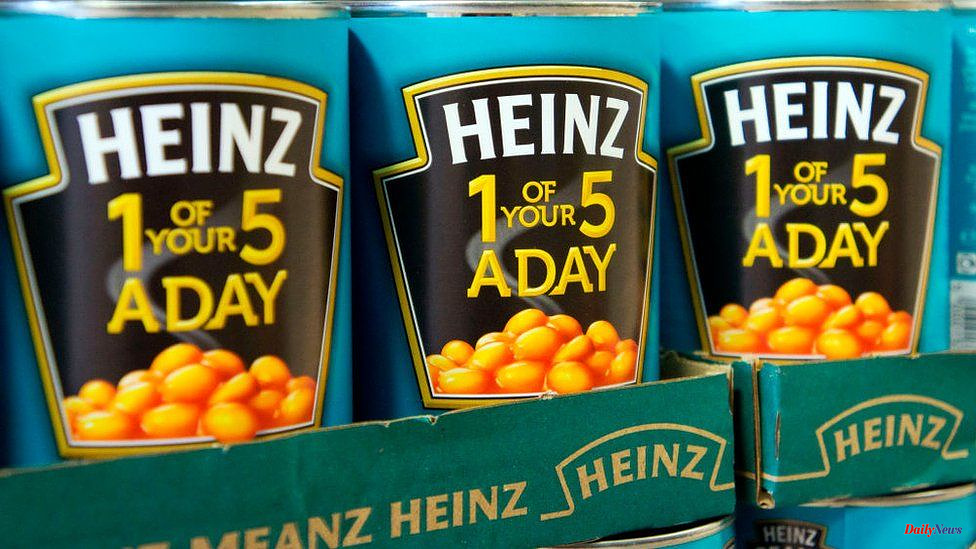Rows of supermarkets and big brands are normally kept behind closed doors. But now, one is openly visible.
Tesco, Britain's largest retailer, is at odds with Kraft Heinz (one of the biggest food producers in the world).
This has led to the disappearance of some of our favourite products, such as Heinz ketchup or baked beans from Tesco's shelves.
Kraft Heinz has halted deliveries because of disagreement about how much Tesco will pay for its products.
This is an example of the difficulties faced by supermarkets and suppliers as they struggle with large cost increases.
Who should feel the pain of rising raw material costs, increased energy prices, and higher fuel bills?
Retailers are undergoing price negotiations. These negotiations have been ongoing for several months.
"Suppliers now say: "This is what we can afford to sell the product to you for. Ged Futter, founder and CEO of The Retail Mind, says, "If you don't agree, I will stop supplying you."
He is more familiar than anyone with the intensity of these negotiations. As a former buyer at Asda, Mr Futter now advises suppliers about how to negotiate with retailers.
"I have a client that is having conversations with a retailer about the price that's required. Tomorrow they need to agree on it and if not, trucks will be stopped.
"I have never seen so many suppliers ready to stop trucks, and I have examples from every single retailer except Aldi of clients stopping trucks."
Supermarkets often have buyers who make deals with suppliers to supply them with goods. It can be an annual agreement for many items like olive oil or tinned tomatoes.
Under the Groceries Supply Code of Practice both sides have the right to modify terms and conditions. Adam Leyland, editor-in-chief at Grocer magazine, said that while retailers used to demand changes in the past, it is now the suppliers who are demanding to renegotiate the amount they get paid.
"Suppliers say we need to change quickly. The supermarkets have been slow to change for a while. This trend has been growing since last year, and it is now starting to change.
It's difficult for both sides. It's not an easy time.
All food supply chains are facing an unprecedented rise in prices. According to the Office for National Statistics (Office for National Statistics), the rate of inflation for manufacturers is now at 22%
How do negotiations work?
Ged Futter says that suppliers are often required to complete a cost justification form to help retailers decide if price increases are justified.
Every part of making a product can be broken down and examined line-by-line.
"Take cardboard. "Take cardboard. The retailer may counter that their costs have increased by 40%. He might offer 20 %,'".
He also claims that some supermarkets use delaying techniques to delay an increase as long as possible.
"Radio silence for 11 and a quarter weeks is what you will likely get from many retailers if a cost price hike is going live in 12 weeks, for example."
Supermarkets with low profit margins are also under pressure.
It's a fight in the aisles for the lowest prices on the most sought-after products.
The demands of hundreds of suppliers are hitting Buying Teams simultaneously. They want to ensure that any increase in cost is justifiable.
One supermarket source says, "There's always an element suppliers adding on a little."
Some of these costs are being covered while others are being passed on. Current food price inflation is around 8%
Ged Futter said that some of his clients are currently in the fourth or fifth wave cost price rises.
Who blinks first in the Tesco-Kraft Heinz spat?
Tesco is twice the size of its closest competitor and has enormous influence. Kraft Heinz, a global giant, is one of few large manufacturers that has the strength to hold its own.
They have also made public comments, which is unusual for them.
Tesco claims it isn’t ready to pass on "unjustifiable prices increases" to customers. Heinz claims that commodity and production costs are increasing and that it isn’t willing to compromise on quality.
As the cost of living begins to rise, Tesco wants to be seen in a positive light as a consumer advocate.
Adam Leyland believes that the supermarket is also sending a larger message to its large suppliers.
He says, "I believe they want suppliers know that they are not going to accept anything that's forced through."
Tesco can't afford to keep shelves empty when they sell hundreds of thousands of Heinz products every week. There is a danger that shoppers will shop elsewhere for their Heinz baked beans and possibly their entire weekly shopping trip.
Mr Leyland said that it is a complex balance act to reach a deal, but that one will be made.
"I believe they will attempt to reach an elegant compromise."












